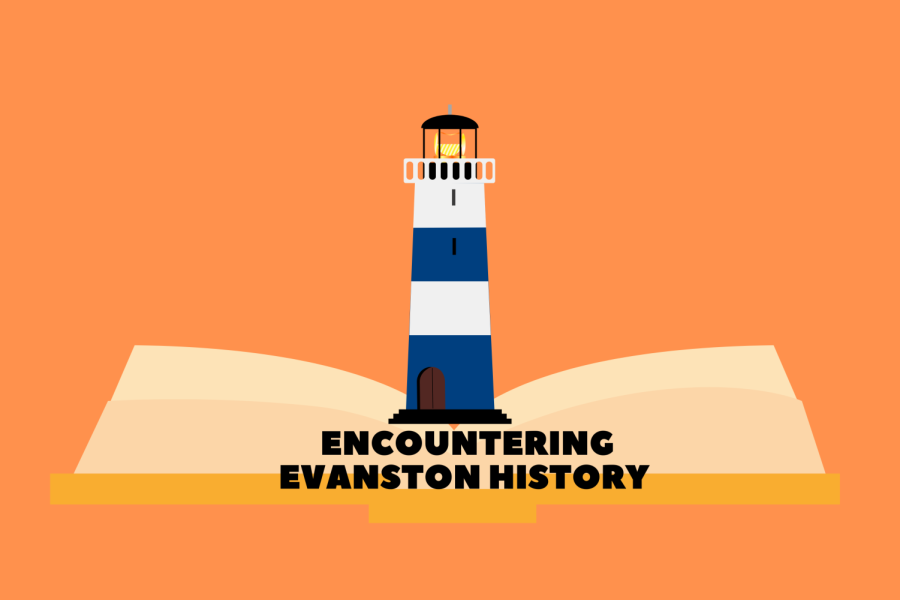Authors of new Evanston history book speak at EPL
Shannon Tyler/Daily Senior Staffer
The book “Encountering Evanston History” shares unique stories on Evanston’s racial formation, social and activist groups and business developments.
April 17, 2023
The authors of “Encountering Evanston History” — a book featuring 75 stories of Evanston locations, residents and experiences— gathered at Evanston Public Library on Wednesday evening for a panel to discuss the text’s historical highlights.
The book, which 18 authors contributed to, compiles yearslong reporting from three local historians and former Evanston RoundTable journalists. In 2013, the writers released three magazines collectively titled “15 Stories, 150 Years” to spotlight Evanston history. But during the pandemic, they decided to turn the magazines into the basis for the book.
“It’s a labor of love. It’s not a chronology of Evanston history,” said Mary Gavin, panelist and founder of the RoundTable. “It’s a story of events, and people and ideas that shaped the way it is.”
Mary Gavin spoke to a panel crowd of about 50 about Black women who formed social clubs in Evanston during the 1890s to advocate for suffrage and build community. Although many Black women joined the suffrage movement in Evanston, they were frequently discriminated against in those spaces, she said. As a result, they created spaces like the Julia Gaston Club and the Matilda Dunbar Club, which both held events at the Ebenezer AME Church, the oldest Black church in Evanston, Mary Gavin said.
She also detailed the formation of the Woman’s Club of Evanston in 1889, which petitioned for better standards in milk and launched a parent-teacher society.
Mary Gavin added that Evanston is built on “venerable” institutions, or social and charitable places such as YWCA, Family Focus and the Infant Welfare Society.
The book also fills in some Evanston historical gaps about involvement of Black groups in the city, according to panelist Dino Robinson, founder of Shorefront Legacy Center.
At the center, Robinson collects Black stories from the North Shore. During the panel, he spoke about the lack of information available about the history of Evanston’s chapter of the NAACP. He turned to various local newspapers to research the formation of grassroots Black organizations for the book.
“When you have put these pieces together, it really creates a compelling storyline of all the different parts of history and connectivity and people and organizations that really create this dynamic article,” Robinson said.
Panelist Larry Gavin, co-founder of the RoundTable, spoke of “segregated towns” as part of an article he wrote for the book about how redlining in Chicago enabled informal racial zoning in Evanston.
Larry Gavin spoke about Evanston’s role as one of the few suburbs surrounding Chicago to not completely segregate. He said Black workers had been able to establish successful businesses in Evanston since they began arriving in the 1850s. However, public spaces such as churches and hospitals remained segregated, he said, and restaurants refused to serve Black people.
Evanston resident Brant Collins said they enjoyed the panel because each speaker shared their own unique research on the city’s history.
“It’s not a chronological history kind of book, but stories by different authors, different voices, and that sounded very appealing to me,” Collins told The Daily.
Robinson said his research revealed patterns of active engagement in Evanston social issues, including the involvement of the same people in multiple civic organizations and their emphasis on collective action. He tied those findings to current efforts to achieve justice for all Evanston residents.
“That’s like the roots of supporting and working with what we are doing now with reparations in Evanston,” Robinson said. “There was a group of people who saw the need to do something.”
Email: [email protected]
Twitter: @Astry_tpwk
Related Stories:
— Panelists discuss race in the digital revolution, impact of social media in journalism
— Evanston History Center hosts virtual tour of Evanston’s eight African American Heritage sites
— Evanston Public Library digitizes Evanston’s historical newspapers












